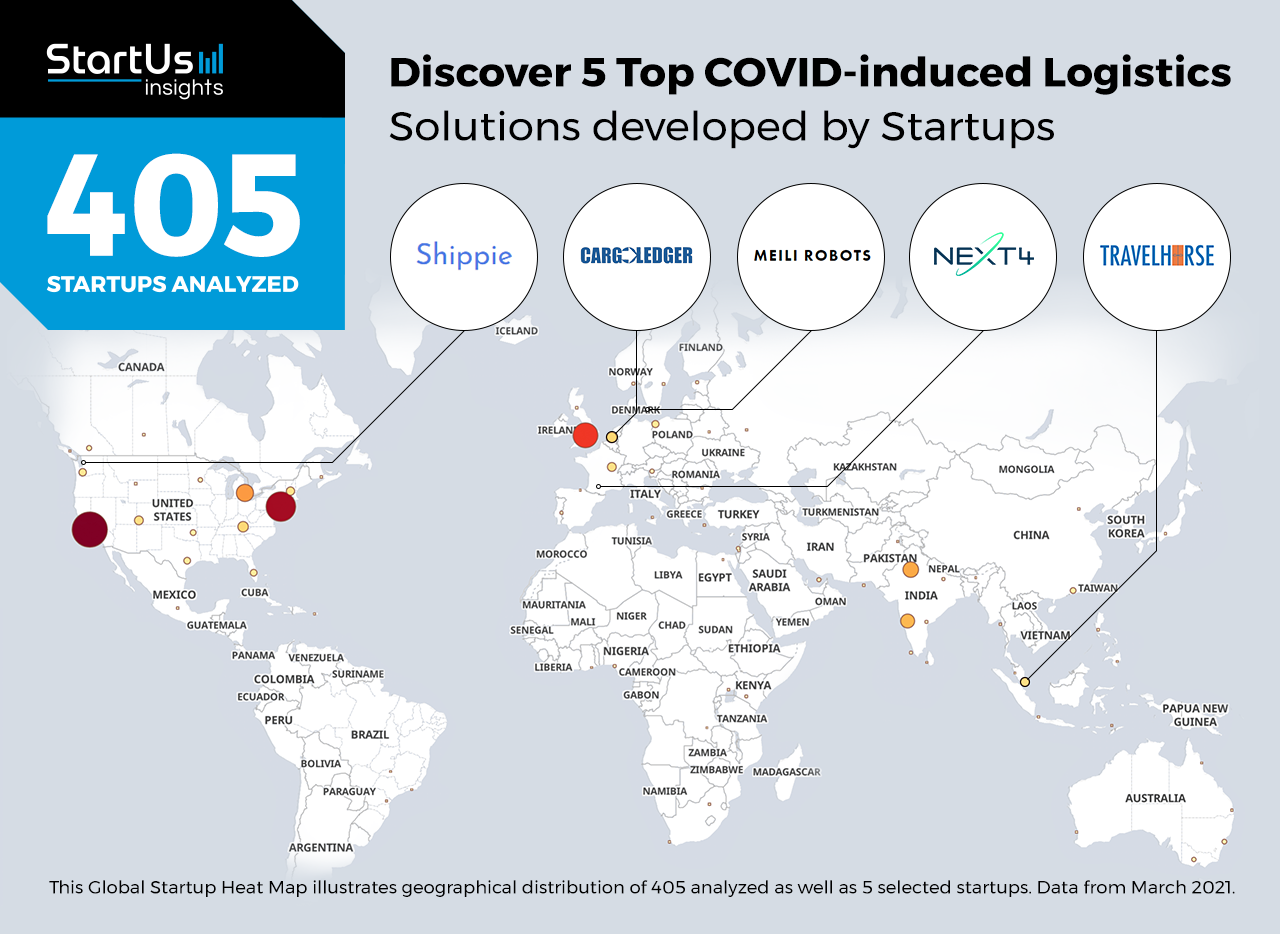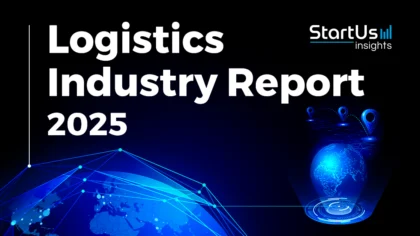Staying ahead of the technology curve means strengthening your competitive advantage. That is why we give you data-driven innovation insights into the logistics industry. This time, you get to discover 5 hand-picked COVID-induced logistics solutions that will continue to impact your business post-pandemic.
Global Startup Heat Map highlights 5 Top COVID-induced Logistics Solutions out of 405
The insights of this data-driven analysis are derived from the Big Data & Artificial Intelligence-powered StartUs Insights Discovery Platform, covering 1.379.000+ startups & scaleups globally. The platform gives you an exhaustive overview of emerging technologies & relevant startups within a specific field in just a few clicks.
The Global Startup Heat Map below reveals the distribution of the 405 exemplary startups & scaleups we analyzed for this research. Further, it highlights 5 logistics startups that we hand-picked based on criteria such as founding year, location, funding raised, and more. You get to explore the solutions of these 5 startups & scaleups in this report. For insights on the other 400 logistics solutions, get in touch.
Shippie enables On-Demand Consumer Logistics
Owing to the COVID-19 pandemic, online shopping for groceries and other daily essentials has significantly increased. The pressure on logistics operations to deliver products in spite of COVID-19 pushes logistics companies to adopt innovative methods that take multiple aspects of the pandemic, such as social distancing, into consideration. As a result, startups and scaleups develop contactless pickup and same-day delivery of consumer goods in cities around the world.
The US-based startup Shippie builds an on-demand consumer-to-consumer logistics platform that allows anyone to send and receive masks, toilet paper, household supplies, and more within their local communities. The startup’s solution is originally based on a peer-to-peer (P2P) laundry service mobile application as a response to COVID-19. In order to limit COVID-19 exposure, the startup supports no-touch remote pickup & delivery for customers with porches & secure buildings. Customers simply place their items in a secure container, box, or bag and place an order on the website for them to be picked up and delivered.
Meili Robots develops an Integrated Mobile Robots Fleet Management System
Fully automated warehouses utilize mobile robots for sorting packages and autonomous forklifts for picking products from shelves. Loading and unloading goods into transport vehicles is also automated in such warehouses. An integrated fleet management system for such automated warehouses increases productivity, efficiency, and reduces the pressure on the human workforce. Considering the pandemic, startups develop integration platforms to operate fully automated warehouses and reduce the level of human involvement.
Danish startup Meili Robots develops an integrated mobile robots fleet management system. The startup’s solution finds applications in industries where autonomous mobile robots (AMRs) or automated guided vehicles (AGVs) are operating. For example intralogistics operations, warehousing, and robot delivery services. Further, the platform updates the maps of warehouses by adding new details including safe zones, obstacles, stations/points, and operational areas.
NEXT4 offers Real-Time Shipment Tracking
The seamless functioning of ports requires human resources, leading to restricted operations during the Coronavirus pandemic. Moreover, the estimated time of arrivals (ETAs) of overseas shipments continuously changes due to delays owing to reduced manpower. As a result, startups develop solutions that track shipments in real-time by taking the various delays that occur at each stage of the supply chain into consideration.
French startup NEXT4 offers dynamic estimated time of arrivals calculations to enable better visibility for tracking overseas shipments. The startup calculates ETAs based on previous shipments with the same departure and destination. As a result, the accuracy of estimations increases with the number of shipments carried out. Moreover, based on the events taking place during the transport and the duration of each step of the trip, this estimation of arrival is constantly updated along the route for better visibility and agility. This allows companies to improve their planning and scheduling of transit times as well as reception of goods.
CargoLedger leverages Blockchain to enable Paperless Logistics Operations
Social distancing and self-isolation are key methods that slow the spread of coronavirus. Digital transformation efforts, for example, paperless logistics operations successfully complement social distancing norms while reducing waste generation. Blockchain technology, in particular, enables all stakeholders to have real-time traceability of transactions, way-bills, and other important documents, allowing logistics companies to better function in spite of COVID.
Dutch startup CargoLedger leverages blockchain technology to transform manual logistics operations into a paperless format. The startup’s solution reduces inefficiencies, controls and audits tasks with smart contracts, creates immutable data and enables instant settlement. This digital transformation reduces risk, saves time and money. Moreover, it eliminates manual data-entries and lessens the need for validation and verification costs thus making the supply chain more agile now – and post-COVID.
Travelhorse develops a Logistics Platform for Last-Mile Deliveries
Staying indoors has increased the reliance on last-mile delivery options across the world. Now more than ever, efficient and effective last-mile delivery is critical for logistics operations. COVID-19 is encouraging startups to develop experimental supply chain models to increase parcel volume, expedite deliveries, and delight customers.
Singaporean startup Travelhorse develops DASH, a logistics platform for last-mile deliveries. DASH includes route planning, dedicated fleet services, electronic proof of contactless delivery. Additionally, the startup enables same-day deliveries for food and beverage products.
Discover more Logistics Startups
Logistics startups such as the examples highlighted in this report focus on supply chain optimization, automation, anticipatory logistics as well as wearables. While all of these technologies play a major role in advancing logistics, they only represent the tip of the iceberg. To explore more logistics technologies, simply get in touch to let us look into your areas of interest. For a more general overview, you can download our free Logistics Innovation Report to save your time and improve strategic decision-making.


![Top 10 Logistics Technology for Digital Transformation [2025]](https://www.startus-insights.com/wp-content/uploads/2025/02/Logistics-Technology-SharedImg-StartUs-Insights-noresize-420x236.webp)






